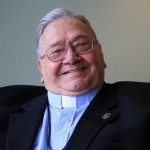Small team sets out on mission
By the Rev. Canon Don Beatty

After the stoning of Stephen, the first Christian martyr, the persecution of Christians became intense in Jerusalem, causing many followers of the Way to flee, taking the Gospel message with them. One of the major cities to the north was Antioch in Syria. Here the faith was established, and it flourished. The followers of the Way were almost all Jewish, but as the faith spread out from Jerusalem, more and more Gentiles became involved. This was especially true in Antioch.
Each synagogue had a number of “God-fearers” – Gentiles who believed in the one God of the Jews, but didn’t want to convert to Judaism. It was very costly to become a Jew in the first century. For male converts, it meant circumcision!
Barnabas was sent from Jerusalem to investigate the work of the followers of the Way in Antioch. After his arrival, he realized that he needed help to maintain the work and to develop the community. He went to Tarsus and invited Paul to join him. The disciples were first called Christians in Antioch (Acts 11:26). Paul and Barnabas worked together there for more than a year.
The church in Antioch was an exciting place to be. The work of the Holy Spirit was very much in evidence. Prophets proclaimed that Barnabas and Paul were to be commissioned for a special work of mission (Acts 13:2-3). Together with Barnabas’s cousin, John Mark, they set out for the island of Cyprus. (Antioch was to remain the centre of Paul’s missionary activity. All of his missionary journeys started there, and it was in Antioch that he seemed to recharge his faith and find support for his work.)
Cyprus was Barnabas’s home, but it is evident that Paul was the leader of this small band of missionaries. Paul established the style that he continued throughout his missionary work. First, he went to the local synagogue, where he would teach about Jesus Christ. For Paul, Jesus was the Jewish messiah, and the Jewish people had a right to hear the message. But as most often happened, it was the God-fearers who responded to the message. A local community of believers was formed with mostly Gentile converts. Paul would leave a local person in charge and then move on, usually forced out because of unrest from the local Jews.
From Cyprus, the mission team crossed to the mainland at Perga, the capital of the Roman province of Pamphylia. Here John Mark left to return home to Jerusalem. We are not sure why he left. Perhaps he was homesick, or he may have been upset that Paul had taken over the team when he thought that Barnabas was to be in charge. This eventually led to a split between Paul and Barnabas.
The first journey moved in a circle around Asia Minor, travelling through centres such as Pisidian-Antioch, Iconium, Lystra and Derbe. In each place, Paul established a small house church, with a local leader in charge. The team visited most of these communities as they returned to Antioch in Syria. It is interesting that Paul reported back to Antioch and not Jerusalem. We see here the start of a shift in authority from Jerusalem.
Paul was always conscious of his Jewish heritage and continually preached to the local Jews, but most of his converts came from the Gentiles. Jesus was the expected Jewish messiah, but his message was for all people. As Luke tells us in the Acts of the Apostles, the church grew daily.
Paul’s teaching was continually challenged by “Judaizers,” Jewish Christians who believed that all converts must become Jews before they could become Christians. This included circumcision for all male converts. This led to the first major controversy in the early church.
During this journey, Paul and Barnabas were confronted regularly by Judaizers, and eventually they went up to Jerusalem to fight for their Gentile converts. The first Council of Jerusalem is dated about 50 CE and can be read in Acts 15. This council included Peter, James and John, along with Paul and Barnabas.
It was James, the brother of Jesus, who came up with a compromise solution. If the Gentile converts would abstain from meat offered to idols, from the blood of animals and sexual immorality, they did not need to follow the other laws of Judaism, including the law of circumcision. The Gentile Christians received all that they wanted, but this controversy continued to plague Paul throughout his ministry.
Next month we will continue with the second journey and the beginning of Paul’s writings. Enjoy the dialogue.
The Rev. Canon Don Beatty is an honorary assistant at St. Luke, Dixie South, Mississauga.